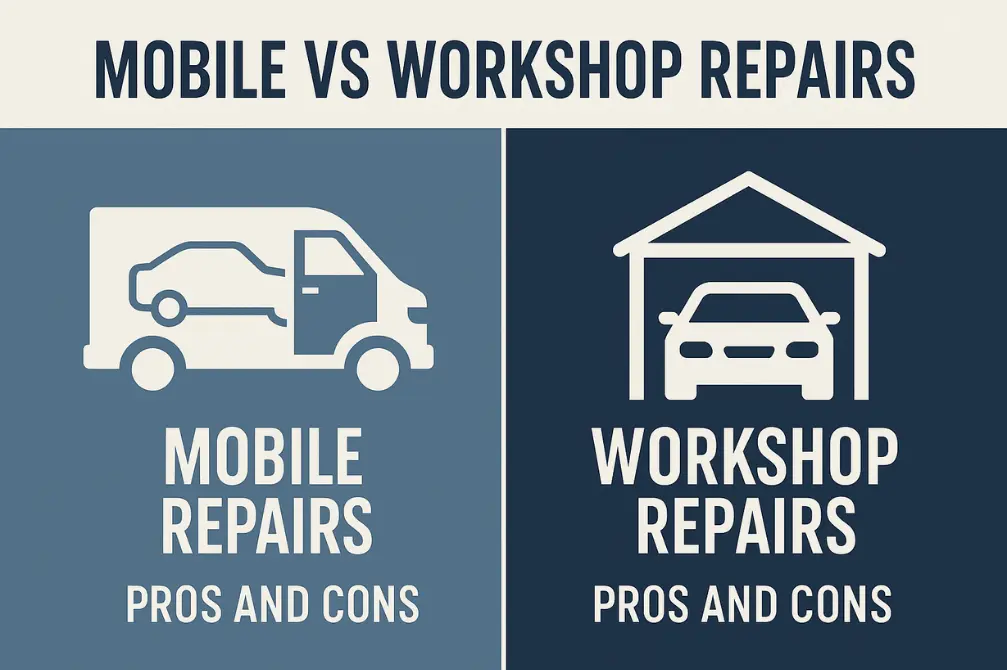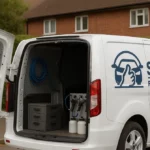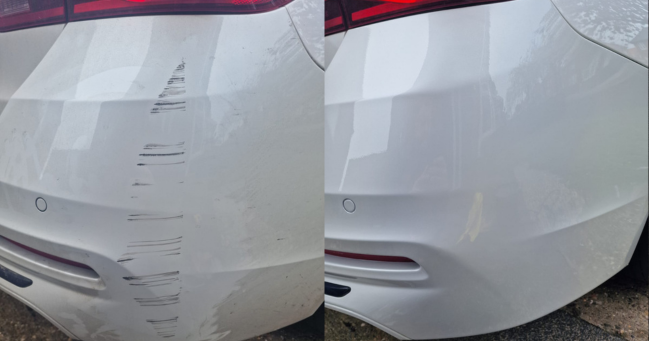
- June 24, 2025
Should You Go Mobile or Hit the Workshop? A Real Talk Guide to Car Repairs
Let’s be honest – we’ve all been there. You’re reversing out of a parking space, concentrating on not hitting the car behind you, when suddenly you hear that awful scraping sound. Your heart sinks as you get out to inspect the damage: a lovely fresh scratch down your bumper or maybe a proper dent courtesy of someone’s poorly placed shopping trolley.
Now what? Do you call one of those mobile repair guys you’ve seen advertised on Facebook, or do you bite the bullet and book your car into a proper body shop? I’ve been in this exact situation more times than I’d care to admit (I’m apparently terrible at judging distances), so let me share what I’ve learned about both options.
The Mobile Revolution: SMART Repairs Come to You
First, let’s talk about mobile SMART repairs. If you’re not familiar with the term, SMART stands for Small to Medium Area Repair Technology – basically, it’s a fancy way of saying “fixing small damage without replacing entire panels.” These mobile technicians have essentially turned their vans into mini workshops on wheels, complete with spray guns, polishing equipment, and all the tools needed to make your car look presentable again.
I’ll never forget the first time I used a mobile service. I’d managed to scrape my alloy wheel against a kerb (don’t judge me, it was a particularly sneaky kerb), and a mate recommended this mobile guy. I was skeptical – how good could a repair be if it’s done in my driveway? But honestly, I was amazed. The technician showed up exactly when he said he would, took one look at the damage, and had it sorted in about two hours. While he worked, I was able to get on with my day, make lunch, and even squeeze in a quick call with my mum.
Why Mobile Repairs Are Brilliant
The convenience factor is absolutely unbeatable. There’s something quite surreal about watching someone fix your car while you’re standing in your pajamas with a cup of tea. No dropping the car off at 8 AM, no awkward phone calls asking when it’ll be ready, and definitely no begging friends for lifts.
Time-wise, it’s a game changer. Most mobile repairs are done and dusted in a few hours. Compare that to booking your car into a body shop where it might sit in a queue for days before anyone even looks at it. I once had a small scratch that took two weeks to get sorted at a traditional garage – two weeks! For something that probably took an hour to actually fix.
The cost difference is pretty significant too. Mobile technicians don’t have the overhead of running a big workshop, paying commercial rent, or employing a team of staff. Those savings get passed on to you. For minor damage, you’re often looking at paying half what a body shop would charge.
But here’s the thing about mobile repairs – they’re absolutely perfect for certain types of damage but completely useless for others. That bumper scuff from the supermarket car park? Perfect mobile repair territory. Small dent from a football? Mobile guy will sort you right out. Paint scratches from someone’s keys (why do people do this?)? Again, ideal for mobile repair.
When Mobile Repairs Fall Short
However, and this is important, mobile repairs do have their limitations. The weather is your biggest enemy. I learned this the hard way when I booked a mobile repair during what turned out to be the wettest day of the year. The poor technician turned up, took one look at the torrential rain, and we had to reschedule. Most mobile technicians will work in light drizzle with some sort of portable shelter, but proper rain or freezing temperatures are a no-go.
Then there’s the space issue. Your car needs to be accessible, and the technician needs room to work. If you live in a narrow terrace with cars parked bumper-to-bumper, or your car’s stuck in a tight garage, mobile repair might not be feasible.
The biggest limitation, though, is the scope of what they can fix. That time I properly dented my door after an unfortunate encounter with a concrete post? The mobile technician took one look and shook his head. “Sorry mate, that’s workshop territory,” he said. And he was right – some damage just needs the full treatment.
The Traditional Route: Workshop Repairs
Body shops, or workshops as we used to call them, are the old-school approach to car repairs. These are proper facilities with paint booths, hydraulic lifts, welding equipment, and teams of specialists who’ve been fixing cars since before mobile repairs were even a thing.
I’ve got to admit, there’s something reassuring about dropping your car off at a proper workshop. You walk into a place that smells of paint and metal, there are cars in various states of repair scattered about, and you just know these people have seen every type of damage imaginable.
Why Workshops Still Have Their Place
For major damage, workshops are absolutely essential. When my neighbor’s tree decided to have a disagreement with my car during a storm, causing structural damage and requiring new panels, there was no question – this was workshop territory. They’ve got the space, the equipment, and the expertise to handle anything from minor touch-ups to complete rebuilds.
The controlled environment is a huge advantage, especially for paint work. Those spray booths aren’t just for show – they maintain perfect temperature and humidity levels, which is crucial for getting paint to cure properly and match exactly. I’ve seen mobile repairs where the color match was slightly off because of environmental conditions, but workshop paint jobs, when done properly, are virtually indistinguishable from factory finish.
Many workshops also have relationships with insurance companies, which can be incredibly helpful if you’re making a claim. They know the paperwork, they speak the insurance language, and often they’ll deal with your insurer directly so you don’t have to.
The Workshop Downsides
But workshops aren’t perfect. The inconvenience factor is real – you’re essentially losing your car for however long the repair takes. Even for minor work, you’re usually looking at leaving it for at least a day, sometimes longer if they’re busy or waiting for parts.
The cost difference is noticeable too. Workshops have higher overheads – they’re paying rent on large premises, employing multiple staff, and maintaining expensive equipment. All of this gets factored into their pricing. For minor cosmetic damage, you might find yourself paying significantly more than you would for a mobile repair.
Wait times can be frustrating as well. Popular workshops often have a backlog, especially if they do a lot of insurance work. I once had to wait three weeks just to get a quote, let alone have the actual work done.
Making the Right Choice: A Personal Decision
After years of dealing with various car damage (I really need to be more careful), I’ve developed my own rule of thumb for choosing between mobile and workshop repairs.
If I can cover the damage with my hand, and it’s purely cosmetic, I go mobile every time. Bumper scuffs, small scratches, minor dents, kerbed alloys – these are all perfect for mobile repair. The convenience and cost savings make it a no-brainer.
But if the damage is structural, involves multiple panels, or requires new parts, it’s workshop all the way. There’s no point trying to cut corners on major repairs – you want them done properly with the right equipment and expertise.
There’s also a middle ground to consider. Sometimes the damage might be borderline – not quite major enough to definitely need a workshop, but more complex than typical mobile repair territory. In these cases, I’ve found it worth getting quotes from both options. Most mobile technicians are honest about what they can and can’t do, and they’ll tell you straight if something needs workshop treatment.
The Bottom Line
Both mobile SMART repairs and traditional workshops have their place in the car repair ecosystem. Mobile repairs have revolutionized how we deal with minor damage – they’re convenient, cost-effective, and often just as good as workshop repairs for the right type of damage.
Workshops remain essential for major repairs and offer advantages in terms of equipment, controlled environments, and comprehensive services that mobile technicians simply can’t match.
The key is being honest about what type of damage you’re dealing with and what your priorities are. If you need your car fixed quickly and cheaply, and the damage is minor, mobile is probably your best bet. If you’re dealing with significant damage, need insurance work, or want the peace of mind that comes with a full workshop service, then that’s the route to take.
At the end of the day, both options can deliver excellent results when chosen appropriately. The most important thing is getting your car repaired properly and safely, whether that’s in your driveway or in a professional workshop.

